Plenary
Bengt Kristensson Uggla
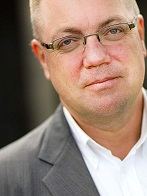 The
battle on reality (Swedish) Th 18/8 09:00 /P1
The
battle on reality (Swedish) Th 18/8 09:00 /P1
In the seminar Bengt Kristensson Uggla will provide a "helicopter perspective" on the rapid changes of our time, and underline the significance of developing a conscious approach to the world around us. A central experience of our time is that all is open to interpretation in new and unexpected ways. However, how are we to understand the fact that we interpret our shared world so differently? How can we share the world today so that we can share it with each other? And, if interpretation is all there is – what then is truth?
In an era of globalization the tension between memory and anticipation tend to make issues of identity crucial. Accepting the possibilities of interpretation compels us to ask the question: what capacity can we ascribe to the human being? And who can you trust?
Bengt Kristensson Uggla is holder of the Amos Anderson Chair of Philosophy, Culture and Management at the Swedish University in Finland, Åbo Akademi University (Turku, Finland). He lives in Stockholm and has recently published the book Ricoeur, Hermeneutics and Globalization (Continuum), among his earlier works he has published Slaget om verkligheten: filosofi, omvärldsanalys, tolkning (Symposion). His presentations in recent years range from being a key speaker at The World Congress of Philosophy (Seoul, Korea 2008) and lecturing at Finansdagen 2009 (Öhrlings PriceWaterhouseCoopers) to a seminar on Business and Art (Amos Anderson Art Museum, Helsinki 2009) and a dialogue presentation together with Johan Cullberg about memory use and the conditions of autobiography (The Medical University Karolinska Institutet, Stockholm).
Merete Mazzarella
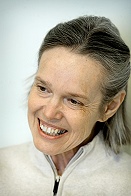 Our
life story, our identity? (Swedish) Th 18/8 15:30 /P2
Our
life story, our identity? (Swedish) Th 18/8 15:30 /P2
An increasingly common perception is that the meaning of your life is the story of your life. “Man is a storytelling animal” says the philosopher Alasdair MacIntyre and further “I cannot answer the question ‘What shall I do?’ until I have answered the question ‘Which stories do I take part in?’”
Most of us can understand ourselves as a product of two cultures: mother’s culture and father’s culture. In my own case this was self-evident – my father was Finnish, my mother Danish – and most often there was some regional or social difference between our parents or (maybe most important) a difference in temperament. My mother’s motto was “Everything’s going to be alright, sooner or later” while my father’s was “Nothing’s gonna be alright, everything’s gonna get worse.” All my life I have maneuvered between those two attitudes. Whether we want it or not, our parents go on living within us, and that is something that we inevitably need to relate to.
Our life changes, our values change. When reading old notes in a diary from my early years I don’t recognize them. I no longer remember that I have written them. It is not just that I no longer think the way I did then; I don’t even remember that I have ever thought that way. This disturbs me – that you can change your opinion about something without being aware of it. If I knew that I, let’s say September the 20:th 1963, had woken up thinking: “Well, now I see why the premarital sex that my cousin probably was engaged in under our grandparents roof once and for all is quite all right – even under the roof of grandparents”. Even values you no longer have must be taken seriously. We take too easy a road if we make fun of them in the same way that we make fun of our outmoded, cast-off clothes on old photos. Just like our parents, our out-of-date values go on living inside us to a greater degree than we might like to think.
Merete Mazzarella, born 1945, Professor of literature, columnist, novelist, former professor of Swedish literature at the University of Helsinki and honorary doctor in medicine at Uppsala University. She has published a great number of books. The title of her latest book is Att resa med rabatt. Om konsten att vara pensionär.
Rolf Sundet
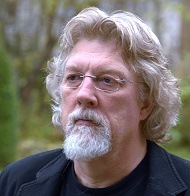 The
joy of collaboration: Interweaving client, resarch and therapist perspective.
(English) Fr 19/8 09:00 /P3
The
joy of collaboration: Interweaving client, resarch and therapist perspective.
(English) Fr 19/8 09:00 /P3
Family based therapy has shifted focus from what can be called a ‘discourse of repair’ towards a ‘discourse of bring forthism’. The traditional focus in family therapy have been to regard problems, diagnoses and sufferings are signs of possible failure or faults within family functioning, and that therapy has to do with the repair of these failures, or seeking to change the family, in a manner that reduce the faults. However, to base the therapeutic work on the family does not necessarily mean such a perspective on suffering and symptoms. A supplementary perspective is that the functioning of the family, their life together, needs to be brought forth in new manners. It is no longer a question of faults and repair but questions of how to build, construct, and bring forth a more preferable life, with less suffering.
The concept of evidence and research based knowledge helps us to cast off the straightjacket of theory. Instead of regulating the work, theory can now become a possible creative reservoir for proposals and ideas on how to work.
At the same time, indications of a new straightjacket for families and therapists can be sensed and seen. I name this ‘the evident bureaucracy’. Evidence supported treatments and evidence based practice can more and more be seen to be part of a bureaucratic machine that implicitly is aimed at creating a well functioning health care system, that is to say, realizing resolutions and decisions made by our politicians. The rules of the bureaucratic machine show through demands of reorganising practical, clinical work in line with a standardization of treatment. Although the intentions are good, there are signs and experiences within therapy practice that the effects do not necessarily mean successful outcome for the families.
The statement of this presentation is that by making collaboration between family and therapist the cornerstone of our work, the noble goals of our politicians and bureaucrats can be realized without developing a new straightjacket that constrains both families and their therapists.
Rolf Sundet, Ph.D., specialist in clinical psychology, Adjunct Associate Professor at Buskerud University College and specialist in clinical psychology at the Family Unit of Buskerud Hospital. He is the author of several articles and books about family therapy.
Sundet, R. (2009) Collaboration: Family and therapist perspectives of helpful therapy. Journal of Marital and Family Therapy.
Sundet, R. (2010) Therapeutic collaboration and formalized feedback: Using perspectives from Vygotsky and Bakhtin to shed light on practices in a family therapy unit. Clinical Child Psychology and Psychiatry, 15(1) 81–95.
Torsteinsson, V.W. & Sundet, R. (2010) Emotions – in need of a supplementary language, Context, February 2010.
Roots and wings – mothers and daughters in discussion of systems theory
Görel Fred is going to interview mother and daughter Annika Forsmark and Marta Nannskog (Swedish) and also mother and daughter Laila Aamodt and Hilde Aamodt (Norwegian). Fr 19/8 16:45–18:00 /P4
The Stockholm Association of Family Therapy for several years has arranged meetings named ”Systemic café” where practitioners have been interviewed by colleagues about their work and their thinking in systemic practice. We now take this form to the big stage of the conference and invite you to listen to a conversation between systemic practitioners of different generations.
How come they work systemically? Where have they found/are they finding inspiration? Is there a difference between systemic practices now and in the past? Will systems theory be “swallowed” by the bigger theory constructions? Do Hilde and Marta shape systemic thinking in their children in the way that Annika and Laila did? Is there a systemic way of relating to your life as a whole? How do you recognize that?
The four women introduce themselves as follows:
Annika Forsmark
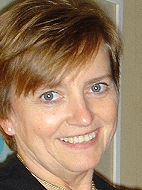 My
name is Annika Forsmark, I was born in Norrköping in 1949. Marta Nannskog is my
daughter. I was raised in a working-class home with strong opinions about
equality, justice and equal rights for every human being. Studying at the School
of Social studies in Stockholm implied a big social change and helped me to
understand that life can be viewed from many different perspectives. Early on I
got in touch with the systemic therapy which gave me opportunity to relate to
the reality that I faced in the therapy school within the child guidance clinic
(PBU) as it was, then in a team of consultants at the child health clinic of
Huddinge hospital and later in private practice as trainer, supervisor and
therapist. I have had the great privilege to get to know people like Gianfranco
Cecchin, Tom Andersen, Harlene Anderson, and Harold Goolishian.
My
name is Annika Forsmark, I was born in Norrköping in 1949. Marta Nannskog is my
daughter. I was raised in a working-class home with strong opinions about
equality, justice and equal rights for every human being. Studying at the School
of Social studies in Stockholm implied a big social change and helped me to
understand that life can be viewed from many different perspectives. Early on I
got in touch with the systemic therapy which gave me opportunity to relate to
the reality that I faced in the therapy school within the child guidance clinic
(PBU) as it was, then in a team of consultants at the child health clinic of
Huddinge hospital and later in private practice as trainer, supervisor and
therapist. I have had the great privilege to get to know people like Gianfranco
Cecchin, Tom Andersen, Harlene Anderson, and Harold Goolishian.
All through life I have had a love relationship to language and narrative which I have been able to satisfy through reading, writing and conversations with people sharing their life stories.
Marta Nannskog
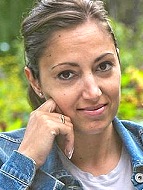 I
am Marta Nannskog and I was born in Stockholm 1977. My mother is Annika
Forsmark, family therapist from Norrköping and my father civil engineer from
Portugal. I was raised in the spirit of Swedish socialist equality, with focus
on justice and equal rights for everybody. Furthermore my mother was very
engaged in the systems theory, which was quite new at the time, and went to see
some of its representatives. This meant that I as a little child travelled with
my mother to Europe and the US and met people like Tom Andersen, Gianfranco
Cecchin, Harlene Andersen and Harry Goolishian.
I
am Marta Nannskog and I was born in Stockholm 1977. My mother is Annika
Forsmark, family therapist from Norrköping and my father civil engineer from
Portugal. I was raised in the spirit of Swedish socialist equality, with focus
on justice and equal rights for everybody. Furthermore my mother was very
engaged in the systems theory, which was quite new at the time, and went to see
some of its representatives. This meant that I as a little child travelled with
my mother to Europe and the US and met people like Tom Andersen, Gianfranco
Cecchin, Harlene Andersen and Harry Goolishian.
After having lived in Firenze and Florida I made up my mind to follow in my mother´s footsteps and take training in social work. The first part of the training I took at Stockholm University with multicultural emphasis and the last part at Lund University highlighting systems theory, among other things. After my degree I worked with rehabilitation of adult addicts and with young people and their families at the Social Services in Lund.
After a couple of years in China I have been living in Oslo for the last five years, working at the Child care services. At present I am working with assessments of children aged 1-12. The workplace is based on systems theory and focusing work on networks.
I feel that all my years of growing up were marked by the systemic perspective and for me it is not a theory but rather a way of looking at people and a stance that you either have or don’t have.
Laila Granli Aamodt
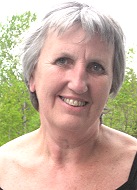 My
name is Laila Granli Aamodt and I was born 1943 in Norland in Norway. After high
school I went to Oslo and took training in social work. Hilde was born about two
weeks before my graduation from the school of social studies. So, she has been
“affected by social work” from birth, which might explain her choice of career.
In 1972 I started working in child and adolescent psychiatry, a field that I
have belonged to through most of my professional life. Today I am employed at
Bærum BUP. Here I have been leading a collaboration project between psychiatry
and child care services. The objective has been to find overall solutions for
families with children who have serious and complex problems. This work is based
on systemic techniques, particularly Tom Andersen's ideas and his concept
reflecting team. In addition we have drawn much help and inspiration from
Gällivare BUP, a clinic that we have visited several times.
My
name is Laila Granli Aamodt and I was born 1943 in Norland in Norway. After high
school I went to Oslo and took training in social work. Hilde was born about two
weeks before my graduation from the school of social studies. So, she has been
“affected by social work” from birth, which might explain her choice of career.
In 1972 I started working in child and adolescent psychiatry, a field that I
have belonged to through most of my professional life. Today I am employed at
Bærum BUP. Here I have been leading a collaboration project between psychiatry
and child care services. The objective has been to find overall solutions for
families with children who have serious and complex problems. This work is based
on systemic techniques, particularly Tom Andersen's ideas and his concept
reflecting team. In addition we have drawn much help and inspiration from
Gällivare BUP, a clinic that we have visited several times.
Having a daughter who is a trained social worker and just as interested in the field as myself, is enjoyable, professionally generative, and exciting. Sometimes I forget that I am her mother and that I am about to enter retirement age. Much rather I get carried away in dreams about projects that we could work on together and develop.
In my leisure time I write professional books and make fleece rugs out of tanned hide.
I have published two professional books:
Den gode relasjonen – støtte, omsorg eller anerkjennelse? (1997), Ad
Notam Gyldendal
Familien mellom mange hjelpere. Refleksjoner i sosialfaglig arbeid.
(2005). Fagbokforlaget.
Hilde Aamodt
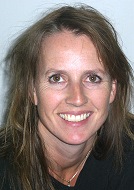 My
name is Hilde Aamodt, I was born in Oslo in 1070. My mother is Laila Aamodt and
just like her I am a trained social worker. I grew up in a neighborhood where
the apartments were staff housing. That meant that all of us children had a mom
or a dad who was a doctor, nurse, social worker or psychologist. I think this
affected my childhood in many ways. In hindsight I can see that my choice of
career is no coincidence and not without influence from my mother. I have got a
masters degree in social work. The title of my thesis is: Brukermedvirkning:
Praksisbaserte erfaringer og etiske begrunnelser. The theme of the paper is
user participation within child care services, and a discussion of Hannah
Arendt’s concepts of action, evil and reflective judgment in a context where
issues of power and dominance are central. As employee in social services, on
one hand, I come across a linear and fact oriented thinking, where we as civil
servants have the power of definition. On the other hand, we have the systemic
way of thinking where user participation is central.
My
name is Hilde Aamodt, I was born in Oslo in 1070. My mother is Laila Aamodt and
just like her I am a trained social worker. I grew up in a neighborhood where
the apartments were staff housing. That meant that all of us children had a mom
or a dad who was a doctor, nurse, social worker or psychologist. I think this
affected my childhood in many ways. In hindsight I can see that my choice of
career is no coincidence and not without influence from my mother. I have got a
masters degree in social work. The title of my thesis is: Brukermedvirkning:
Praksisbaserte erfaringer og etiske begrunnelser. The theme of the paper is
user participation within child care services, and a discussion of Hannah
Arendt’s concepts of action, evil and reflective judgment in a context where
issues of power and dominance are central. As employee in social services, on
one hand, I come across a linear and fact oriented thinking, where we as civil
servants have the power of definition. On the other hand, we have the systemic
way of thinking where user participation is central.
As employee in social services, on one hand, I come across a linear and fact oriented thinking, where we as civil servants have the power of definition. On the other hand, we have the systemic way of thinking where user participation is central.
In the Bærum municipality we have chosen a systemic perspective in our work. For me that is exciting and inspiring as we tend to associate a systemic way of thinking with family therapy, treatment and institutions characterized by voluntariness. My concern is in what way the systemic perspective can become the fundamental perspective also within the social care of children and adolescents. I am also engaged in thoughts on what position the systemic perspective gets in relationship to methods and practices anchored in the medical model.
Mark Hopfenbeck
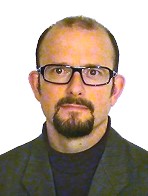 Dialoguing
the emergent future of family therapy: On the complex adaptive dynamics of
collaborative practice (English) Sa 20/8 09:00 /P5
Dialoguing
the emergent future of family therapy: On the complex adaptive dynamics of
collaborative practice (English) Sa 20/8 09:00 /P5
An enormous development of knowledge has taken place since systems thinking was founded in the fifties. What consequences might this development have for family therapy practitioners? With roots back to Gregory Bateson, Ivan Boszormenyi-Nagy and Humberto Maturana, and with Jaakko Seikkula as my current source of inspiration, I am hoping for a creative dialogue about the future of family therapy.
In my talk, I want to focus on three themes. The first concerns our understanding of “The systemic”. Systems thinking has passed through many phases of development and now complexity theory emerges as a possible source of increased insight. Based on the last ten years of research within that field I would like to discuss what it means to look at the family as a complex adaptive system.
The second theme I want to focus on is our understanding of family dynamics. Which processes have the greatest significance for the family? There is an increasing awareness on the role of feelings in the family interaction. Traditionally, feelings have been difficult to do research on; however, new studies within social psychology and neurophenomenology have contributed to new knowledge about the central role of feelings in understanding the dynamics of the family.
The third theme I want to talk about is our understanding of family therapy as a collaborative practice. How are we to relate to discourses about empowerment, resilience, recovery, positive psychology, and “new” concepts such as mindfulness, mentalisation and motivating interviews etc? How can we integrate these ways of knowledge and cultural currents in future family therapy?
Mark Hopfenbeck is a social anthropologist, culture geographer and ecologist. He is working at Karlstad University with development of a theory on “the experiential ecology of emotional exchange networks” based on his research on the emotional interaction in network meetings. He is also employed by Gove University College as responsible for the further education program in network meeting and relational competence. For the past five years he has been a member of a group collaborating with Jaakko Seikkula in arranging an annual seminar on open dialogue on the island of Lesvos in Greece.

